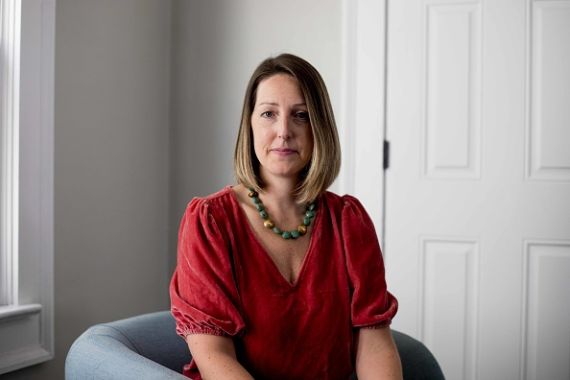US doctor reprimanded, fined for talking about child’s abortion
There are no restrictions on Dr Caitlin Bernard’s medical licence after a lengthy hearing that mirrored national divides over abortion.

A doctor who drew national attention in the United States for revealing she had performed an abortion on a 10-year-old rape victim was reprimanded and fined by a medical board for violating patient privacy laws.
The state of Indiana’s Medical Licensing Board found gynaecologist Caitlin Bernard had violated privacy laws when she spoke publicly about the case without the consent of the patient or her guardian. It voted to fine her $3,000 while allowing her to continue practising medicine.
Keep reading
list of 4 itemsUS appeals court preserves limited access to abortion pill
Biden administration to bring abortion pill case to Supreme Court
Florida Governor DeSantis signs abortion ban into law
At the nearly 13-hour hearing Thursday, the board dismissed two other allegations in the complaint filed by Indiana Attorney General Todd Rokita, finding Bernard had not violated laws about reporting suspected child abuse and had not failed to stay informed of relevant reporting and privacy laws.
The board issued no restrictions on her practice of medicine.
The case highlighted the sharp political divide over abortion in the US, and the challenges healthcare providers face in the wake of last June’s US Supreme Court decision to overturn the Roe v Wade precedent that had protected abortion under federal law, leaving regulation to the states.
That decision put into effect an Ohio law that prohibited abortions after six weeks of pregnancy, before many women know they are pregnant, and that made no exception for rape or incest.
Bernard has consistently defended her actions, and she told the board on Thursday that she followed Indiana’s reporting requirements and hospital policy by notifying hospital social workers about the child abuse — and that the girl’s rape was already being investigated by Ohio authorities. Bernard’s lawyers also said that she did not release any identifying information about the girl that would break privacy laws.
The Indianapolis Star had cited the girl’s case in a July 1 article that sparked a national political uproar weeks after the Supreme Court ruling.
Some news outlets and Republican politicians had falsely suggested Bernard fabricated the story about the 10-year-old’s abortion, until a 27-year-old man was charged with the rape in Columbus, Ohio. During an event at the White House, President Joe Biden nearly shouted his outrage over the case.
Medical board President Dr John Strobel said he believed Bernard went too far in telling a reporter about the girl’s pending abortion and that physicians need to be careful about observing patient privacy.
“I don’t think she expected this to go viral,” Strobel said of Bernard. “I don’t think she expected this attention to be brought to this patient. It did. It happened.”
Bernard’s lawyer Alice Morical told the board Thursday that the doctor reported child abuse of patients many times a year and that a hospital social worker had confirmed with Ohio child protection staffers that it was safe for the girl to leave with her mother.
“Dr Bernard could not have anticipated the atypical and intense scrutiny that this story received,” Morical said. “She did not expect that politicians would say that she made the story up.”
Amid the wave of attention to the girl’s case last summer, Rokita, who is stridently opposed to abortion rights, told Fox News he would investigate Bernard’s actions and called her an “abortion activist acting as a doctor”.
Deputy Attorney General Cory Voight argued Thursday that the board needed to address what he called an “egregious violation” of patient privacy and Bernard’s failure to notify Indiana’s Department of Child Services and police about the rape.
“There’s been no case like this before the board,” Voight said. “No physician has been as brazen in pursuit of their own agenda.”
Voight asked Bernard why she discussed the Ohio girl’s case with the newspaper reporter and later in other news media interviews rather than using a hypothetical situation.
Bernard called it “incredibly important” for the public to know the consequences of the changing legal landscape.
“I think it’s important for people to know what patients will have to go through because of the legislation that is being passed, and a hypothetical does not make that impact,” she said.
During Thursday’s hearing Rokita’s office kept up a running commentary on its official Twitter account, with one post saying, “When Bernard talked about the high priority she puts on legislation and speaking to the public, she did so at the expense of her own patient. This shows where her priorities are as an activist rather than a doctor.”
Bernard objected to Voight saying her choice to publicly discuss the case led to the misconduct allegations.
“I think if the attorney general, Todd Rokita, had not chosen to make this his political stunt, we wouldn’t be here today,” Bernard said.
The Indiana board — with five doctors and one lawyer present who were appointed or reappointed by Republican Governor Eric Holcomb — had wide latitude under state law allowing it to issue reprimand letters or suspend, revoke or place on probation a doctor’s licence.
Ohio’s law imposing a near-ban on abortion was in effect for about two months, before being put on hold as a lawsuit against it plays out. Indiana’s Republican-dominated Legislature approved a statewide abortion ban weeks after the Ohio girl’s case drew attention, but abortions have continued to be permitted in the state while awaiting an Indiana Supreme Court decision on the ban’s constitutionality.
Bernard had unsuccessfully tried to block Rokita’s investigation last fall, although an Indianapolis judge wrote that Rokita made “clearly unlawful breaches” of state confidentiality laws with his public comments about investigating the doctor before filing the medical licensing complaint against her.